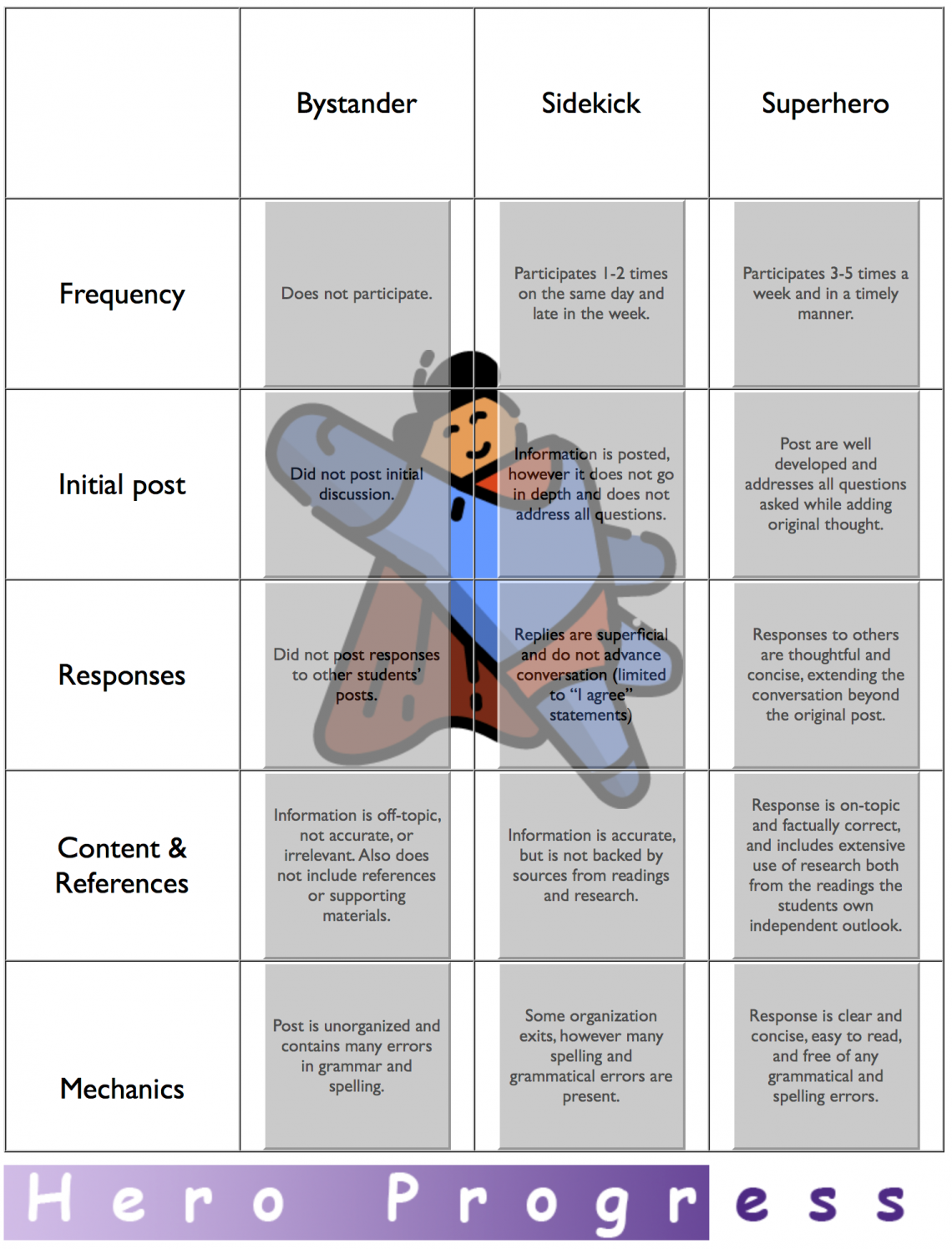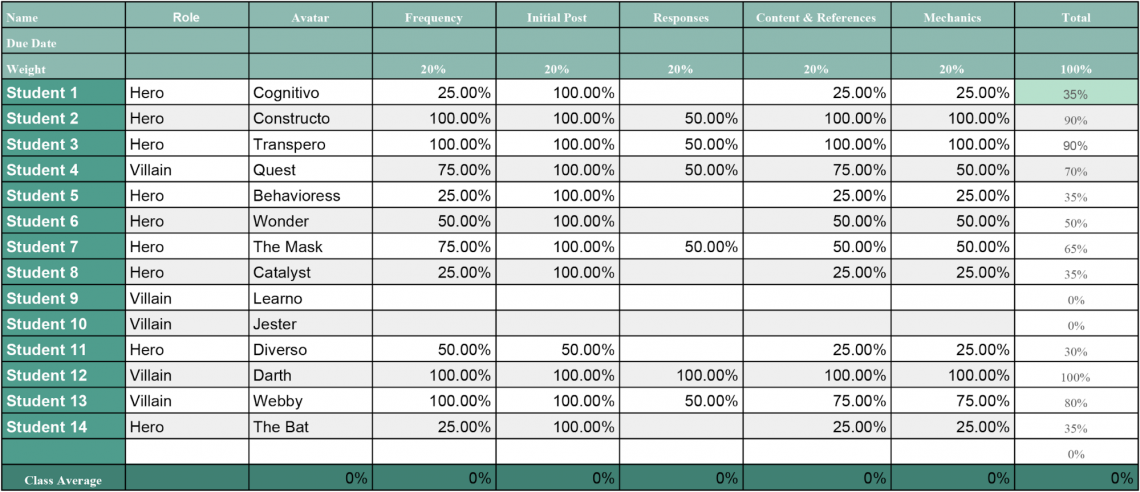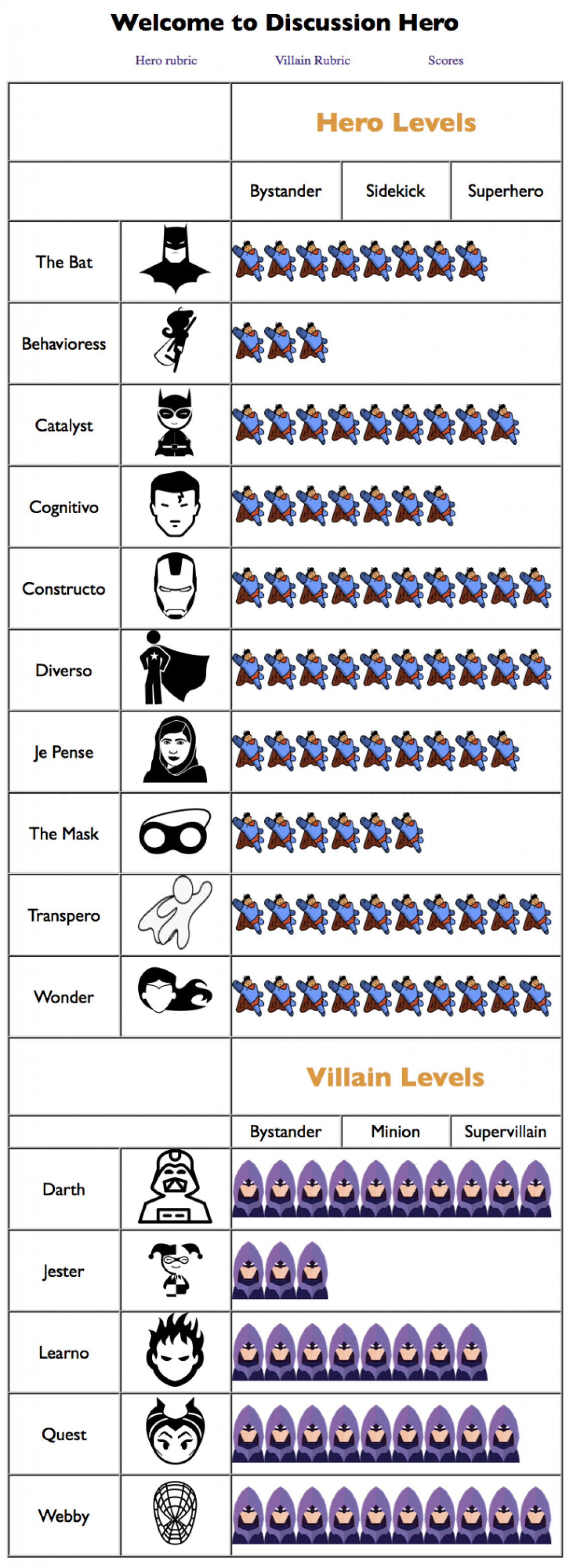Late in the summer of 2017, Jacob Guerra-Martinez, a learning designer and game-design researcher in Northwestern’s School of Professional Studies, pitched an audacious plan—he wanted to gamify a discussion board so that graduate students could choose between being a hero or villain while debating and supporting opposing views. He called this idea Discussion Hero.
The previous year, David Noffs had developed a course on Learning Environment Design for graduate students in the School of Professional Studies. During the development process, Noffs decided to include an innovative, Northwestern-developed discussion tool called Nebula into his course. Nebula provides a graphic representation of real human interaction, levels of activity and student interest…something that Noffs found enormously useful and important when striving for a more learner-centered online course environment.
During the same course development process, Noffs also learned of Guerra-Martinez’s research into gamification, which was another topic he planned to introduce to his students. The two joined forces not long after the course launched, applying for and receiving both an Educational Technology Teaching Fellowship and Digital Learning Fellowship that allowed them to do further research on gamification of online courses.
While there have been many innovations in the area of online teaching, Noffs and Guerra-Martinez discovered that many teachers still struggle to find ways to get their students excited about participating in discussion boards, particularly in graduate and adult education. The same “post once, reply twice” format used almost universally by online instructors increasingly bores students. Gamification is a strategy that many teachers are finding useful when it comes to student engagement, yet while many good ideas exist for assignments and overall participation in the course, there appear to be a lack of options in graduate and continuing education programs for those that wish to gamify their discussion forums. That is where Discussion Hero comes in.
How Discussion Hero Works
Discussion Hero turns discussion boards into debating boards and, as a result, encourages respectful debate using hero and villain avatars. Discussion Hero combines the traditional awarding of points with a gamified progress meter allowing students to see how they are performing on their posts and competing to reach higher status on the discussion leaderboard.When launching Discussion Hero, instructors choose a discussion topic or topics where Discussion Hero will be used. Students then choose their own avatar and role from lists made available in the avatar and role questionnaire. Currently, they can choose between two roles—hero and villain. Students then participate in the discussion board with their role in mind. The discussions appear in Canvas pages similar to Nebula network graphs. In contrast to Nebula, however, student names are replaced with their avatar names.
Heroes are scored via a Hero Rubric and their progress appears on a leaderboard. Heroes state their position/s and provide support for that position and other defenders of their position. Heroes start out as Bystanders, which is the first level, and then earn points in order to upgrade their status to Sidekicks (think Robin of Batman and Robin) and finally, Superheroes. The more closely students adhere to the rubric, the faster they attain Superhero status.
Heroes cannot exist without Villains. Villains are scored via a Villain Rubric and they also appear on the leaderboard. They are the adversaries who challenge our heroes, making them stronger with each confrontation. Villains play a very necessary role in creating rich and dynamic discussions. Villains may be mischievous or just take on the role of “devil’s advocate” as they debate the hero, questioning their assertions while providing counter information that they also need to support in some way. Villains start out as Bystanders, which is the first level, and then earn points in order to upgrade their status to Minions and finally, Supervillains.
Encouraging Student Feedback
Discussion Hero piloted in Noffs’ course in the spring of 2018. It was used in a discussion during week seven of a ten-week course, and the results were extremely positive. Compared to the previous weeks’ discussion, there was a 26% increase in participation, with many taking roles that were different from what they normally would assume, i.e. most students actually asked to take on villain roles. At the end of the course, students reported an overwhelmingly positive response: 67% claimed they were motivated to participate more than in a regular discussion, and over 90% of the class said they would like or be willing to use the activity in other courses.Many students stated that the role of the villain made them feel comfortable enough to state ideas they may have otherwise kept to themselves. One student praised how Discussion Hero enabled them to, “[make] pointed statements without seeming overly critical." Others said that they, "... enjoyed the low risk, competitive aspects," and yet another commented that, "I think the argumentative nature made the discussion posts more entertaining and interactive."
Discussion Hero was used in another in a graduate course during the fall of 2018, this time in a communications course. During a discussion on the five dimensions on which an audience can be analyzed, one student took on the villainous role of “Darth.” Throughout the discussion, the student used villain terms related to their character (“dark side,” “force”) when challenging other students’ posts or asking questions. Darth even took the five dimensions and provided context from their own character’s perspective, enriching the conversation by showing how the character’s values could be transposed on each dimension.
For example, Darth wrote,
- “Allied, but not the Rebel Alliance. My workforce must be in 100% agreement with me in order for us to work together to achieve a win. Any doubts, discontent or weakness will not be tolerated. With building projects as large as the ones I manage, everyone must be of one (dark) mind.”
In response, a hero called “Constructo” countered,
- “Hello Lord Vader, while I am certain that your communication approach has served you well (evidenced by the massive death star that you own), I might suggest you try easing up on the demands and need for absolute loyalty and subservience. You might find that with a little freedom your followers might come to you with some inspiring ideas, like not building a death star with such obvious vulnerabilities. Remember that you too once weren't always so dark. Maybe there's a little light inside that could help take your goals of domination to the next level?
- I will be on my way now, I mean you no disrespect... wait, what are you doing? I can't breathe! I was just trying to be constructive! Give me another chance Lord Vader! I am sorry for being insubordinate! It will never happen again I promise!”
The Future of Discussion Hero
The Northwestern team behind Nebula headed up by Jacob Collins is working to make it as easy to install and run Discussion Hero in any Northwestern Canvas course as Nebula. If you would like to learn more about Discussion Hero or find out about deploying it in your course, please contact David Noffs.



